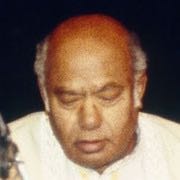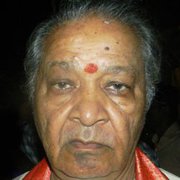Ravi Shankar KBE (Bengali pronunciation: [ˈrobi ˈʃɔŋkor]; born Robindro Shaunkor Chowdhury, spelled Ravindra Shankar Chowdhury in Sanskrit; 7 April 1920 – 11 December 2012), whose name is often preceded by the title Pandit (Master), was an Indian sitar virtuoso and a composer. He became the world's best-known exponent of North Indian classical music, in the second half of the 20th century, and influenced many other musicians throughout the world. Shankar was awarded India's highest civilian honour, the Bharat Ratna, in 1999.
Shankar was born to a Bengali Brahmin family in India, and spent his youth as a dancer touring India and Europe with the dance group of his brother Uday Shankar. He gave up dancing in 1938 to study sitar playing under court musician Allauddin Khan. After finishing his studies in 1944, Shankar worked as a composer, creating the music for the Apu Trilogy by Satyajit Ray, and was music director of All India Radio, New Delhi, from 1949 to 1956.
In 1956, Shankar began to tour Europe and the Americas playing Indian classical music and increased its popularity there in the 1960s through teaching, performance, and his association with violinist Yehudi Menuhin and Beatles guitarist George Harrison. His influence on Harrison helped popularize the use of Indian instruments in Western pop music in the latter half of the 1960s. Shankar engaged Western music by writing compositions for sitar and orchestra, and toured the world in the 1970s and 1980s. From 1986 to 1992, he served as a nominated member of Rajya Sabha, the upper chamber of the Parliament of India. He continued to perform until the end of his life.





















